Jeyendra
Saraswathi:
Brahmin
Reformer
or
Murderer?
by
Shan
Ranjit
July
1994,
Kanchipuram,
Tamil
Nadu:
Maha
Periaval
(Sri
Chandrasekar
Saraswathi
,
the
predecessor
of
the
present
Mutt
head,
Sri
Jayendrar
Saraswathi
,
who
is
accused
in
a
murder
case)
had
attained
Maha
samadhi
(
permanent
liberation)
only
a
few
months
before.
He
was
cremated
inside
the
mutt
itself
in
Kanchipuram.
In
front
of
this
sacred
samadhi
the
famous
Mandolin
player
Srinivas
and
his
bother
Raju
are
giving
a
heart
-rending
mandolin
performance.
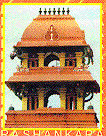 When
myself
and
my
wife
entered
the
mutt,
all
those
inside
the
mutt
-
especially
the
younger
Brahmins
-
turned
their
attention
towards
us.
Their
behavior
was
not
only
perplexing
to
me,
but
also
annoying.
This
is
a
mutt
that
is
considered
to
be
the
"Vatican"
of
Southern
India
(
especially
for
the
Tamil
Brahmins).
I
am
still
not
sure
what
made
these
young
Brahmins
focus
their
attention
on
us.
Maybe
both
of
us
were
dressed
somewhat
extravagantly
-
my
wife
in
a
rich,
flashy
Kanchipuram
saree
and
my
self
in
a
colored
silk
verti).
When
myself
and
my
wife
entered
the
mutt,
all
those
inside
the
mutt
-
especially
the
younger
Brahmins
-
turned
their
attention
towards
us.
Their
behavior
was
not
only
perplexing
to
me,
but
also
annoying.
This
is
a
mutt
that
is
considered
to
be
the
"Vatican"
of
Southern
India
(
especially
for
the
Tamil
Brahmins).
I
am
still
not
sure
what
made
these
young
Brahmins
focus
their
attention
on
us.
Maybe
both
of
us
were
dressed
somewhat
extravagantly
-
my
wife
in
a
rich,
flashy
Kanchipuram
saree
and
my
self
in
a
colored
silk
verti).
When
Srinivas
finished
his
program,
several
young
Brahmins
approached
us
and
started
talking
to
us.
I
found
this
very
odd
for
a
simple
reason.
I
had
very
much
wanted
to
pay
my
humble
respects
to
the
Maha
Perival’s
samadhi.
He
was
considered
a
"walking
God"
on
earth
when
he
was
alive.
However,
in
front
of
his
own
samadhi,
his
close
followers'
behavior
was
somewhat
questionable.
Some
of
the
young
Brahmins
wanted
us
to
buy
their
silver
coins
-
which
they
took
out
of
their
pocket
-
in
dollars.
I
was
shocked
at
this
request
.
Sure,
the
Indian
temples
are
well
known
for
their
commercialism
and
corruption,
but,
I
never
expected
such
behavior
inside
the
Kanchi
mutt.
All
of
a
sudden,
there
was
some
commotion.
From
his
small
room,
the
present
head,
Sri
Jeyandrar
emerged
with
his
followers
.
He
had
his
famous
"Thanda"
(
a
long
bamboo
stick)
in
his
hand.
He
went
to
a
middle
of
the
compound
to
conduct
a
fire
ritual.
All
those
young
Brahmins
immediately
scattered
,
and
were
now
following
their
Guru
to
the
ritual
spot.
Yet,
they
were
giving
signals
for
us
wait
for
them.
I
found
their
behavior
and
conduct
very
troublesome.
I
was
upset
to
learn
that
commercialization
had
even
crept
into
this
once
sacred
mutt.
Today,
the
present
head
of
the
Kanchi
mutt
,
Sri
Jeyendrar
is
the
prime
accused
in
the
murder
of
Sankararamanan.
Sankara
amanan
was
the
manager
of
the
Varadarajaperumal
Temple
in
Kanchipuram
-
the
temple
belongs
to
the
Kanchi
mutt.
Sankararamanan
was
a
staunch
and
fanatical
devotee
of
Maha
Perival
(the
late
Sri
Chandrasekhar).
His
family
has
been
at
the
service
of
the
Kanchi
mutt
for
generations.
When
the
present
head
and
the
accused,
Sri
Jeyandrar,
took
over
as
the
head,
there
were
many
differences
between
Sankararamanan
and
Jeyandrar.
Jeyandrar
wanted
to
bring
major,
revolutionary
changes
within
the
ancient
and
traditional
Kanchi
mutt.
Sankararamanan
strongly
opposed
such
changes
based
on
the
old
traditions
of
the
mutt.
When
Jeyandrar
wanted
to
go
to
China,
Sankararamanan
opposed,
arguing
that
the
ancient
Hindu
tradition
bars
the
Kanchi
head
from
crossing
the
ocean.
He
moved
his
appeal
to
the
Madras
high
court.
Before
the
court
could
give
the
verdict,
Jeyandrar
announced
that
he
was
canceling
his
China
visit.
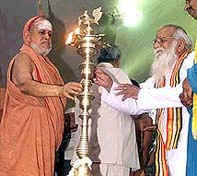 Sankararamanan
was
a
perpetual
complainer.
He
wrote
hundreds
of
anonymous
letters
accusing
the
Kanchi
mutt
of
fund
misappropriation.
The
Kanchi
mutt
is
considered
one
of
the
wealthiest
mutts
in
India.
He
even
accused
the
employees
of
the
mutt
in
scandalous
sexual
affairs.
Sankararamanan
was
a
perpetual
complainer.
He
wrote
hundreds
of
anonymous
letters
accusing
the
Kanchi
mutt
of
fund
misappropriation.
The
Kanchi
mutt
is
considered
one
of
the
wealthiest
mutts
in
India.
He
even
accused
the
employees
of
the
mutt
in
scandalous
sexual
affairs.
Sankara
Ramanan
was
becoming
a
big
headache
for
the
mutt.
Two
months
ago,
while
he
was
in
the
office
(inside
the
temple
premises),
five
highly
inebriated
men
barged
into
his
office
and
grotesquely
chopped
him
to
death
-
in
front
of
many
witnesses
who
have
refused
to
testify.
The
Tamil
Nadu
police
say
that
there
is
convincing
evidence
that
the
person
who
gave
the
order
to
kill
Sankara
Ramanan
was
none
other
than
Sri
Vijendrar
,
the
present
mutt
head.
The
price
for
the
murder
was
a
whopping
45
lakhs
Indian
rupees-
according
the
police
this
money
was
drawn
from
the
Mutt’s
bank
account.
WHO
IS
SRI
JEYENDRAR?
He
is
short,
stout
and
with
a
graybeard.
He
wears
only
dark
orange
robes;
holy
ash
is
prominently
applied
and
displayed
all
over
his
body;
he
normally
carries
a
long
bamboo
stick
(thanda)
whereever
he
travels.
That
man
is
none
other
than
the
70
year
old
Jayendra
Saraswathi
,
the
69th
pontiff
of
Kanchi
Kamakoti
Peetam
,
considered
to
be
the
most
ancient
and
influential
Hindu
mutt
in
India
and
the
world.
The
Kanchi
Mutt
was
established
in
the
8th
century
AD
by
Adi
Shankara
.
Because
he
runs
the
mutt
and
its
activities
as
a
successful
business
venture,
he
was
called
as
the
CEO
(
Chief
Executive
Officer)
of
Kanchi
Mutt,
Inc.
FROM
PALANQUINS
TO
EXECUTIVE
JETS:
Jayendra
has
defied
almost
all
the
ancient
customs
and
practices
laid
down
by
his
mutt
since
assuming
the
office
of
Pontiff.
Today
he
is
driven
around
in
an
air-conditioned
bullet-proof
Tata
Sumo
van
–
previous
pontiffs
had
refused
to
use
any
mode
of
modern
transport
and
walked
or
were
carried
in
palanquins.
Jeyndrar
travels
across
India
in
charted
executive
planes
-
unheard
of
and
unthinkable
in
mutt
history.
While
only
devotees
surrounded
previous
pontiffs,
Jayendra
was
surrounded
and
fiercely
protected
by
security
men,
drawn
from
the
same
force
that
guards
the
Presidents
and
Prime
Ministers
of
India.
His
predecessors
kept
away
from
politics
and
politicians.
His
immediate
predecessor
-
much
loved
and
known
as
Periavar
who
died
at
the
age
of
100
some
time
back
-
did
not
even
break
his
Mauna
viratham
(Vow
of
silence)
when
Indra
Gandhi
once
visited
him.
She
sat
before
him
for
more
than
an
hour,
with
tears
rolling
down
her
cheeks
without
a
single
word
spoken
between
them.
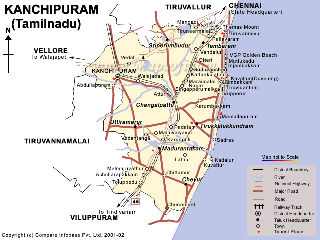 Jeyendrar,
without
any
hesitation,
dealt
with
all
shades
of
politicians
–
from
controversial
Hindu
extremists
to
Muslim
fundamentalists.
While
other
pontiffs
religiously
avoided
cameras
and
TV,
Jeyendra
was
the
most
photographed
Hindu
monk
in
India.
Jeyendrar,
without
any
hesitation,
dealt
with
all
shades
of
politicians
–
from
controversial
Hindu
extremists
to
Muslim
fundamentalists.
While
other
pontiffs
religiously
avoided
cameras
and
TV,
Jeyendra
was
the
most
photographed
Hindu
monk
in
India.
He
even
wanted
to
break
the
most
ancient
Hindu
custom
-
never
cross
the
ocean
and
go
abroad.
Due
strong
opposition
within
the
mutt,
he
had
to
give
up
that
idea.
JEYENDRA
–
THE
REBEL
Jeyendra
was
born
in
1931
to
a
middle
class
Brahmin
family
in
a
village
called
Irulneeki
(remover
of
darkness)
in
Thanjavur
district
in
Tamil
Nadu.
His
father
taught
him
the
Vedas
and
Hindu
scriptures
at
an
early
age.
As
per
the
ancient
traditions
of
the
mutt,
his
predecessor
chose
Jeyendra
at
an
early
age
to
succeed
him.
Jeyendra
then
underwent
some
of
the
most
rigorous
monastic
training
at
the
Kanchi
mutt
for
the
next
several
decades.
Adi
Shankara,
the
founder
of
the
Kanchi
sect,
lived
around
the
8th
century
AD.
It
is
interesting
to
know
that
Adi
Sankarar
never
established
the
mutt
in
Kanchipuram.
He
established
four
mutts
in
India
-
Sringeri
in
the
Western
Ghats
in
Karnataka
is
the
only
mutt
that
he
established
in
South
India
.
Nobody
clearly
knows
how
the
Kanchi
mutt
became
established.
Kanchipuram
(also
called
Kanchi)
lies
about
145
Kms
from
Chennai.
Kanchi
is
famous
for
its
colorful
and
expensive
Kanchipuram
sarees.
Kanchi
was
once
the
capital
city
of
the
Pallava
kings.
Kanchi
mutt
is
considered
the
bastion
of
orthodox
Brahminism.
The
rules
and
regulations
at
this
orthodox
mutt
are
so
strict
that,
until
some
years
ago,
non-Brahmins
were
not
even
allowed
to
have
their
meals
with
Brahmins.
It
has
branches
all
over
the
world.
Jayendra
has
been
a
rebel
from
an
early
age.
He
did
not
like
the
absolute
dominance
and
sway
of
the
orthodox
Brahmins
over
the
Kanchi
mutt.
However,
he
was
simply
powerless
and
helpless
as
long
as
he
remained
the
second
in
command.
About
two
decades
ago,
becoming
frustrated
with
the
mutt,
he
ran
away
and
sought
recluse
in
a
small
monastery
near
Mysore
in
Karnataka.
For
more
than
two
weeks
no
one
could
find
him.
The
Brahmins
were
embarrassed,
and
when
they
found
him,
they
pleaded
with
him
to
come
back
to
Kanchi.
REFORMER
OR
PUBLICITY
SEEKER?
When
Jeyendra
became
the
69th
pontiff,
he
was
determined
to
change
the
practices
and
customs
at
his
ancient
mutt.
Today,
there
are
more
non-Brahmins
than
Brahmins
visiting
the
mutt.
Even
Dalits
(untouchables)
have
started
visiting
the
mutt.
He
has
said
that
anybody
could
touch
him
and
move
freely
within
his
mutt.
Previously
,
only
Brahmins
could
do
service
to
the
Pontiff.
The
Orthodox
Brahmins
were
furious
over
the
changes
effected
by
Jayendra.
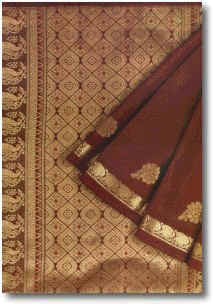 DABBLING
IN
POLITICS:
DABBLING
IN
POLITICS:
Jeyendra
had
an
opinion
on
every
single
controversial
political
and
economic
issue
in
India.
He
freely
appeared
on
TV,
expressing
his
opinions.
In
fact,
critics
accuse
him
of
rendering
more
opinions
on
politics
and
economy
than
on
Vedanta.
He
confers
with
the
Prime
Minister
of
India
on
the
Kashmir
issue
one
day
and
the
next
day
is
seen
seated
with
fundamentalist
Muslim
leaders
dealing
with
the
tricky
Ayodhya
issue.
Politicians
of
all
hues
visit
him
to
seek
advice
and
get
blessing.
The
former
Prime
Minister
of
Sri
Lanka,
Ranil
Wickremasinghe,
once
made
a
special
visit
to
the
Kanchi
mutt,
and
was
closeted
with
Jeyendrar
for
a
long
time.
Economists
and
top
rung
businessmen
wait
for
days
to
get
an
appointment
with
him.
However,
the
pet
project
of
Jayendra
is
rural
empowerment
and
Dalit
(untouchables)
enlistment.
This
is
astonishing
for
a
Pontiff
whose
mutt
has
been
at
the
forefront
of
protecting
and
propagating
Orthodox
Brahminism.
NO
MORE
HINDU
TEMPLES:
Jayendra
issued
a
firm
order
that
not
to
build
any
more
new
Hindu
temples.
Instead,
he
wanted
the
resources
to
be
used
for
building
schools
and
hospitals
that
will
immensely
benefit
the
poor.
This
has
been
the
main
difference
between
him
and
the
fundamentalist
Hindu
extremists,
who
have
gone
on
a
temple-building
spree
of
late.
The
Kanchi
mutt
under
Jayendra's
guidance
was
involved
in
a
large
number
of
social
and
charitable
activities
throughout
India
and
abroad.
He
gathered
a
group
of
young
men
and
women
who
have
promised
their
services
to
create
a
society
that
is
not
only
hunger-
free,
but
also
devoid
of
any
socio-religious
conflicts.
In
fact,
Jaeyndra
preaches
that
the
best
way
for
the
souls
to
attain
inner
peace
and
liberation
is
through
such
social
service
activities.
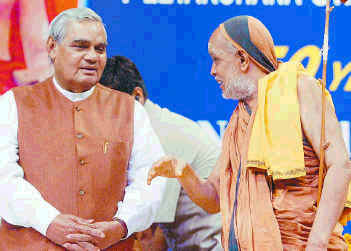 FROM
SCHOOLS
TO
HOSPITALS:
FROM
SCHOOLS
TO
HOSPITALS:
Jeyendra
has
promised
that
he
will
build
50
schools
throughout
India
that
will
offer
free
education.
The
mutt
runs
a
deemed
university
where
courses
ranging
from
Sanskrit
to
sciences
are
offered.
It
runs
several
free
hospitals
in
various
parts
of
India;
runs
a
rural
health
clinic
for
tribal
in
remote
mountainous
regions;
and
provides
free
health
services
for
terminally
ill
patients
in
Chennai.
It
is
estimated
the
mutt
manages
about
1,000
crore
through
its
various
projects.
FURIOUS
ORTHODOX
BRAHMINS:
Orthodox
Brahmins
have
been
furious
with
Jayendra.
They
are
angry
with
him
for
traveling
in
vans
and
planes;
they
are
upset
that
he
has
allowed
the
untouchables
inside
their
ritually
clean
mutt;
they
are
pained
that
he
accepts
food
from
everyone.
Jayendra
has
had
an
excellent
rapport
with
the
Muslim
leaders.
Muslim
leaders
have
respected
and
trusted
his
yearning
for
communal
peace.
In
fact,
when
he
was
arrested
many
Muslims
leaders
protested.
But
this
cordial
relation
with
the
Muslims
has
brought
trouble
with
the
Hindu
extremists.
They
accuse
Jayendra
of
getting
too
close
with
the
Muslims.
In
fact,
the
Hindu
extremists
have
threatened
his
life.
RAJA
GURU:
The
pontiffs
of
the
Kanchi
mutt
has
been
known
as
the
‘
Raja
Guru
‘
(
chief
priest)
for
the
Kings
of
Nepal
for
centuries.
The
Kanchi
mutt
also
has
the
sole
responsibility
for
appointing
the
Brahmin
priests
for
the
ancient
Devayani
temple
in
Kataragama,
Sri
Lanka.
For
centuries,
the
priests
at
the
Devayani
temple
have
come
from
a
particular
Brahmin
sect
in
Allahabad,
North
India.
TWO
FACTIONS
INSIDE
THE
MUTT:
Jeyandrar’s
junior
-
Sri
Vijendrar
-
was
chosen
by
the
late
Sri
Chandrsekhar
(
Maha
Periaval).
The
junior
is
also
known
as
"
Bala
Periyavar".
The
junior
came
from
a
Tamil
Nadu
Brahmin
family.
He
was
chosen
when
he
was
young.
It
is
believed
that
there
have
been
many
frictions
between
Jeyndrar
and
Vijeyndrar.
The
junior
has
been
a
traditionalist,
sticking
with
the
ancient
customs
of
the
mutt.
Hence,
the
junior
was
a
favorite
of
the
orthodox
Tamil
Nadu
Brahmins.
There
are
rumors
that
the
brother
of
the
Junior
Swami
(
Ragu)
has
been
a
thorn
in
the
relationship
between
the
senior
and
Junior.
There
are
unsubstantial
rumors
that
Ragu
had
a
terrible
weakness
for
women.
I
think
Jeyndrar
foolishly
thought
that
he
could
be
a
Sanyasi
and
also
dabble
in
politics.
Politics
is
a
dirty
game.
Politics
is
not
for
those
who
claim
that
they
have
given
up
everything
and
taken
the
high
road
of
spiritualism.
Let
this
be
a
good
lesson
for
all
those
spiritual
aspirants
that
they
should
keep
away
from
politics
if
they
want
to
advance
in
their
quest
for
spirituality.
Like
Catholism,
Hinduism
should
seriously
consider
whether
Hindu
monks
-
especially
those
who
come
into
contact
with
the
people
-
should
be
celibate.
 When
myself
and
my
wife
entered
the
mutt,
all
those
inside
the
mutt
-
especially
the
younger
Brahmins
-
turned
their
attention
towards
us.
Their
behavior
was
not
only
perplexing
to
me,
but
also
annoying.
This
is
a
mutt
that
is
considered
to
be
the
"Vatican"
of
Southern
India
(
especially
for
the
Tamil
Brahmins).
I
am
still
not
sure
what
made
these
young
Brahmins
focus
their
attention
on
us.
Maybe
both
of
us
were
dressed
somewhat
extravagantly
-
my
wife
in
a
rich,
flashy
Kanchipuram
saree
and
my
self
in
a
colored
silk
verti).
When
myself
and
my
wife
entered
the
mutt,
all
those
inside
the
mutt
-
especially
the
younger
Brahmins
-
turned
their
attention
towards
us.
Their
behavior
was
not
only
perplexing
to
me,
but
also
annoying.
This
is
a
mutt
that
is
considered
to
be
the
"Vatican"
of
Southern
India
(
especially
for
the
Tamil
Brahmins).
I
am
still
not
sure
what
made
these
young
Brahmins
focus
their
attention
on
us.
Maybe
both
of
us
were
dressed
somewhat
extravagantly
-
my
wife
in
a
rich,
flashy
Kanchipuram
saree
and
my
self
in
a
colored
silk
verti). Sankararamanan
was
a
perpetual
complainer.
He
wrote
hundreds
of
anonymous
letters
accusing
the
Kanchi
mutt
of
fund
misappropriation.
The
Kanchi
mutt
is
considered
one
of
the
wealthiest
mutts
in
India.
He
even
accused
the
employees
of
the
mutt
in
scandalous
sexual
affairs.
Sankararamanan
was
a
perpetual
complainer.
He
wrote
hundreds
of
anonymous
letters
accusing
the
Kanchi
mutt
of
fund
misappropriation.
The
Kanchi
mutt
is
considered
one
of
the
wealthiest
mutts
in
India.
He
even
accused
the
employees
of
the
mutt
in
scandalous
sexual
affairs. Jeyendrar,
without
any
hesitation,
dealt
with
all
shades
of
politicians
–
from
controversial
Hindu
extremists
to
Muslim
fundamentalists.
While
other
pontiffs
religiously
avoided
cameras
and
TV,
Jeyendra
was
the
most
photographed
Hindu
monk
in
India.
Jeyendrar,
without
any
hesitation,
dealt
with
all
shades
of
politicians
–
from
controversial
Hindu
extremists
to
Muslim
fundamentalists.
While
other
pontiffs
religiously
avoided
cameras
and
TV,
Jeyendra
was
the
most
photographed
Hindu
monk
in
India. DABBLING
IN
POLITICS:
DABBLING
IN
POLITICS: FROM
SCHOOLS
TO
HOSPITALS:
FROM
SCHOOLS
TO
HOSPITALS: